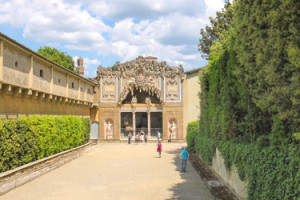We are launching a new Master’s programme in Garden & Landscape History this October here at the Institute of Historical Research. Librarian and lifetime-learner Clare Brown was excited to hear about our new MA and wrote to tell us about her experience of Garden History.
The MA in Renaissance Studies which I started in 2005 was the first serious study I’d done since leaving university in 1995. I didn’t have any preconceived ideas about it, yet neither did I want to do anything related to ‘literature’ or traditional ‘art’. The reason I didn’t want to do literature was because my first degree was a joint honours in English and Librarianship. This ruled out Shakespeare and other literary modules. The reason I didn’t want to do ‘art’ was pure contrariness.
I’d made a conscious decision to choose courses in which I had no grounding at all. I wanted nothing conventional. Thankfully, The University of London promotes interdisciplinary study and allows you to connect diverse subjects.
I saw that Italian Renaissance Gardens was offered as the summer term module and immediately signed up. I knew nothing about English gardens or any kind of garden, apart from the fact they are pleasant to sit in when it’s sunny and best to avoid on wet visits to Versailles. So my starting point was open minded ignorance.
Comparing Renaissance Italy and Enlightenment England served to remind me that England was a cultural backwater for most of the early modern period, until travel became wide spread. Everything began in Italy and wealthy English land owners took these fashionable ideas and made them suit the English countryside. Hence the interdisciplinary nature of the study of Garden History: to get a sense of its origins, you have to look to Italian literature, culture, botany. It was in doing this that I came upon the Medici gardens and met the man of my dreams.
The man of my dreams was Francesco I de Medici, Grand Duke of Tuscany. He was a hopeless statesman and worse ruler, but as a science-obsessed melancholic dreamer, he was perfect. After an introduction to him in one of the course lectures, I was hooked. I also had my essay topic. My module course work focused on the Grotto Grande in the Boboli gardens. This necessitated a midweek dash to see it in the flesh, and was the first of many Italian garden visits where I’ve skipped the churches, galleries and academies in favour of curious outdoor mannerist fancies.
I brought together alchemy and natural philosophy as a way of understanding the grotto, which led to my dissertation topic. My title was ‘Pratolino and the transforming influence of natural philosophy’. The topic is PhD worthy in my view so ultimately, I probably didn’t do it justice, but I achieved something to be proud of, and it has informed much of my later work and interest and opened up a fresh way of thinking about places I’ve visited.

